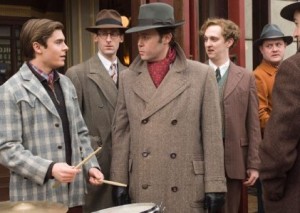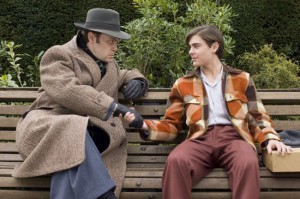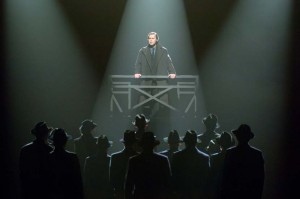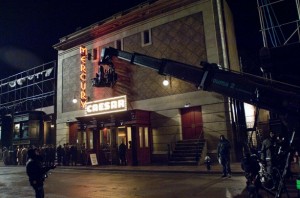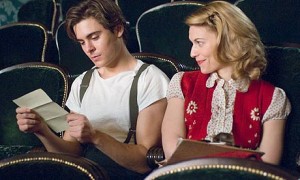Written for the FIPRESCI web site from the 33rd Toronto International Film Festival in September 2008. — J.R.
The continuing mythological status of Orson Welles in the realm of cinephilia complicates the challenge of representing Welles on film in many different ways. It’s one of the clearest merits of Richard Linklater’s Me and Orson Welles, which premiered at the Toronto International Film Festival, to have met and grappled responsibly with many if not all of the issues of this formidable challenge.
Working uncharacteristically with a script written by others — Holly Gent Palmo and Vince Palmo, adapting a novel by Robert Kaplow that I haven’t yet read — Linklater tells the story of a fictional high school teenager (played by Zac Efron, best known for his role as Link Larkin in the recent remake of Hairspray) in 1937 who by sheer chance lands a bit part as a lute player in Welles’s famous stage production of Shakespeare’s Julius Caesar, a highly edited modern-dress adaptation known as Caesar built around the conceit of the story taking place in contemporary fascist Italy, with a bare set illuminated by “Nuremburg” lighting. Linklater has obviously researched existing records of this production (which include photographs, a script published some years ago by Welles scholar Richard France, and at least two audio recordings of the play performed by essentially the same cast around the same time) in considerable detail. And he has found an English actor, Christian McKay, to play Welles (who took the role of Brutus in Caesar in addition to directing it) whose capacity to impersonate the actor-director at age 22 is simply uncanny. What he hasn’t done especially well is convey much sense of the political tenor of the period, late Depression, in which the thrust and meaning of the contemporary fascist allegory of this production had a lot to do with its impact and success. In this respect, one might say that the strengths and weaknesses of this film are almost precisely the reverse of those in Tim Robbins’ 1999 Cradle Will Rock, which depicted a somewhat earlier Welles stage production with more political savvy but much less sympathetic interest in or insight into Welles himself.
Happily, Linklater’s gifts as an entertaining storyteller with a flair for period detail (as he exhibited in his underrated feature of a decade ago, The Newton Boys) makes up for this limitation. He also carries his baggage as a Welles scholar lightly so that audience members aren’t belabored by it: even though some actors’ appearances closely match their real-life counterparts (such as actor Norman Lloyd and even an incidental figure like lighting designer Jean Rosenthal), others don’t (such as actor Joseph Cotton and producer John Houseman), and a few significant figures in the production (e.g. author-composer Marc Blitzstein, who previously wrote The Cradle Will Rock) are essentially ignored. Given the flavorsome yet uncluttered sense of detail throughout, it’s an entirely defensible approach.
The highly entertaining treatment of Welles as a monstre sacré also works very well, although here a greater amount of artistic and thematic license may be necessary in order to accept it all. I think it could be argued that the subtle theme of the story as a whole is egotism — not just that of Welles but also that of his actors and crew, and even that of a young aspiring writer whom the hero gets to know. Welles’ egotism, which has always been an essential part of the Welles myth, is perhaps also the most indestructible part because it serves as an implicit inspiration and even license for the egotism of other young and ambitious artists. One of the most telling sequences in Linklater’s film occurs just after Caesar‘s opening-night triumph, in which all the backstage chatter that we hear from various participants reflects the egotism of the speaker, which this triumph has both unleashed and legitimated. But it doesn’t always match up convincingly with the historical Welles, however gratifying it may be to believe in the mythical version.
Based on my own hour-long meeting with Welles, I would describe him as having been both inordinately self-absorbed and even more inordinately aware of his self-absorption and eager to compensate for it with whatever form of generosity he could muster up, a trait that was no less genuine. This is beautifully illustrated in a key scene in Me and Orson Welles, set in a park behind the New York Public Library (spoiler ahead), when Welles manages to cajole the hero into rejoining the production for opening night after having recently quit in a jealous rage. (The hero, having recently been seduced by an equally ambitious production assistant played by Claire Danes, can’t tolerate it when Welles, a prolific womanizer, takes over as her lover.) What doesn’t ring true is the subsequent twist — when the hero later learns that Welles, carrying a grudge, has replaced him with another actor after the opening-night performance. Judging from all the reports I’ve read and heard from people who worked with Welles, this kind of spitefulness doesn’t ring true, and it seems significant that we never see the character again after we learn this fact, because I’m not sure even Christian McKay could have brought it off.

